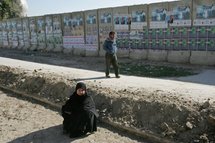
UN special envoy Ad Melkert also held talks with parliament speaker Iyad al-Samarrai and Iraq's Sunni Arab Vice President Tareq al-Hashemi, who last month vetoed a draft election law that MPs had agreed and has threatened to do so again with a new text.
The UN Assistance Mission in Iraq (UNAMI) said that it saw "February 27, 2010 as a feasible option for practical and constitutional reasons."
No definitive election date has yet been set. Iraq's parliamentary polls had originally been scheduled for January 16 but have been delayed because of a failure by members of parliament to agree on a law to govern the vote.
In principle, Iraq's constitution requires that the poll be held by the end of January.
"UNAMI strongly supports ... the announcement of a final election date, with February 27, 2010 as a feasible option for practical and constitutional reasons," it said in a statement.
It added that Melkert "has responded positively to multiple suggestions to assist in finding solutions for the few outstanding questions concerning the election law," without giving details.
The United States has put pressure on Iraqi politicians to avoid a delay as Washington seeks to ensure that the drawdown of tens of thousands of troops stationed in the country goes ahead on schedule.
Although MPs approved a new electoral law last month, it was vetoed by Hashemi.
Last week, MPs passed an amended version and it is currently before Iraq's three-member presidential council, composed of Talabani, a Kurd, and vice presidents Hashemi and Adel Abdel Mehdi, a Shiite.
Only one of them needs to veto the bill for it to be sent back to parliament again.
Talabani called on MPs on Wednesday to quickly pass a compromise draft that the presidency council does not need to veto, and added that parliament's term, which is due to expire on March 15, could be extended for up to one month.
"We want to pass this law quickly, so that the election is not delayed for a prolonged period," he told the state-funded Al-Iraqiya television channel.
He added: "The president of the republic, the prime minister and parliament have the right to prolong parliament's term by a month but we have not yet decided to do so."
---------------------------------------------------------------------------------------------------------------------------------
The UN Assistance Mission in Iraq (UNAMI) said that it saw "February 27, 2010 as a feasible option for practical and constitutional reasons."
No definitive election date has yet been set. Iraq's parliamentary polls had originally been scheduled for January 16 but have been delayed because of a failure by members of parliament to agree on a law to govern the vote.
In principle, Iraq's constitution requires that the poll be held by the end of January.
"UNAMI strongly supports ... the announcement of a final election date, with February 27, 2010 as a feasible option for practical and constitutional reasons," it said in a statement.
It added that Melkert "has responded positively to multiple suggestions to assist in finding solutions for the few outstanding questions concerning the election law," without giving details.
The United States has put pressure on Iraqi politicians to avoid a delay as Washington seeks to ensure that the drawdown of tens of thousands of troops stationed in the country goes ahead on schedule.
Although MPs approved a new electoral law last month, it was vetoed by Hashemi.
Last week, MPs passed an amended version and it is currently before Iraq's three-member presidential council, composed of Talabani, a Kurd, and vice presidents Hashemi and Adel Abdel Mehdi, a Shiite.
Only one of them needs to veto the bill for it to be sent back to parliament again.
Talabani called on MPs on Wednesday to quickly pass a compromise draft that the presidency council does not need to veto, and added that parliament's term, which is due to expire on March 15, could be extended for up to one month.
"We want to pass this law quickly, so that the election is not delayed for a prolonged period," he told the state-funded Al-Iraqiya television channel.
He added: "The president of the republic, the prime minister and parliament have the right to prolong parliament's term by a month but we have not yet decided to do so."
---------------------------------------------------------------------------------------------------------------------------------









 Home
Home Politics
Politics









